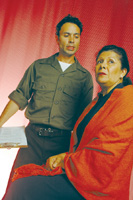home | metro silicon valley index | the arts | stage | review

Photograph by Dave Lepori
The son also rises: Sammy (Eric Avilés) leaves his mother (VIVIS) in the 1930s to live in the United States.
Crossing Over
Teatro Visión's 'La Victima' follows generations of migration in one family
By Marianne Messina
STARTING IN 1915, Teatro Visión's La Victima shows us snippets of a Mexican family's history as it becomes entwined in America's fickle immigration policy. First performed in 1976, the play's sweeping plot hits the high-profile Mexican-American issues up to that time. In the late 1930s, amid political "promises to rid the country of Mexicans," Amparo (VIVIS) and her husband Julian (Rodrigo García) are separated from their son Sammy (Eric Avilés). (The talented VIVIS breathes realism into the mother ideal: strong, resilient, loving, sacrificing, adding a touch of humor to every pain.)
Amparo and Julian struggle to make a life with their two other children, while Sammy grows and prospers in the United States with the family who took him in. Sammy becomes a soldier in the Korean War; his two siblings make their way to the United States and become involved in the labor protests of the '60s and '70s. Everyone has issues with border patrol, including Sammy, who joins them but has qualms when he is asked to conduct raids.
Throughout the play, the texture of the action is tempered by a mellow folk combo of guitars, accordion and singers, who fill in historical background through the interludes. The creative concert of theatrical elements in this production speaks above the words, 60 percent of which are in Spanish. (The Spanish song lyrics are rendered in English supertitles, and non-Spanish speakers can look forward to Blood Wedding, next spring, which will feature English supertitles in its entirety.) The large, pale pastel tiles of the stage floor are patterned in narrowing rows that give a sense of perspective reaching into a far distance. The performance space is kept clear but divided into halves, front and back, by high chain-link fencing with swirl-wire atop it, reminiscent of the divide in Teatro Visión's Electricidad between the haves and have-nots. Two couples painted on two tall diptychs provide portals for the actors, but they also suggest the revolving door of the U.S. border for families such as Amparo's.
The two acts of the play divide nicely between the first half, which is steeped in the music, language and sensibility of Durango, Mexico, and the second half, in which we see the tensions of a family divided along the cultural and economic lines that the fence comes to signify. Rock-influenced "La Bamba" and Caribbean-flavored "Lemon Tree" and even a little bayou boogie break into the feel of Mexican folk music. The first half is also brimming with creativity and dance: a ballroom scene, a choo-choo line of people stamping in a row across the stage to create a "train," the sound of castanets rendering its puffing engine.
The ensemble action in the second act becomes picketing. Still, the strong aural presence of the folk band establishes the continuity of a culture, while its visual presence adds to the sense that this story has many observers. Director Elisa Marina Alvarado ensures that there are always observers. Nameless women sit on the set boxes around the edges of the action; people mull behind the fence looking in. There's a sense that the family members being portrayed are representative (la raza) or seminal, making way for those affected by their actions and owing to those who have gone before. This constant presence of others appears in drawings of faces on the set boxes and in Jacob Vega-Canote's final slide show (mounted on tall narrow panels to either side of the stage), rows and columns of changing faces. As a member of humanity, the effect is a powerful sense of nexus; but as an individual it brings the claustrophobic sense of inundation. Sammy, like the world at large, responds to both these impulses, so he lives with both sides of an ongoing debate that the play, like history, leaves unresolved.
La Victima, a Teatro Visión production, plays Thursday-Saturday at 8pm and Sunday at 2pm through Oct. 29 at the Mexican Heritage Plaza Theater, 1700 Alum Rock Ave., San Jose. Tickets are $7-$40. (408.272.9926)
Send a letter to the editor about this story.
|
|
|
|
|
|